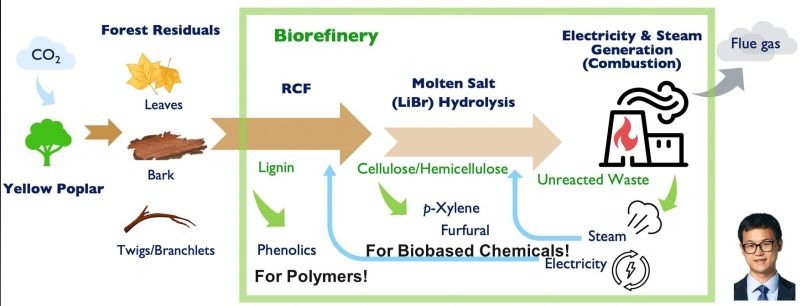Growing Convergence Research lecture series
Upcoming Informational Webinar: Convergence Science as Collaborative Problem-Solving
Tuesday, December 17, 2024
4:00 PM to 5:00 PM (EST)
Featured lecture video
Previous lecture videos:
This recording features an informative lecture with convergence science experts from across the Nation. The following projects were presented.
- Project: Jumpstarting Successful Open-Source Software Projects with Evidence-based Rules and Structures
-
Project: The Convergent Impact of Marine Viruses, Minerals, and Microscale Physics on Phytoplankton Carbon Sequestration
-
Project: Managing Future Risk of Increasing Simultaneous Megafires
-
Project: Common Pool Resource Theory as a Scalable Framework for Catalyzing Stakeholder-Driven Solutions to the Freshwater Salinization Syndrome
February 3, 2022
View this video, which features two awardee teams funded in the first GCR competition.
Project Title: Life Cycle Management of Materials: Sustainable Biomass to Designer Polymer Systems
PI: Dr. Thomas H. Epps, III Allan & Myra Ferguson Distinguished Professor of Chemical & Biomolecular Engineering, University of Delaware
Project Title: Biomolecular Systems Engineering - Unlocking the Potential of Biological Programming
PI: Dr. Corey J. Wilson, King-Chavez-Parks Professor of Chemical & Biomolecular Engineering, Georgia Institute of Technology
June 29, 2021
Synopsis: Research teams that pursue convergence will confront a variety of difficulties. To help identify and cope with some of these difficulties, NSF has assembled a panel of experts who have led large research centers, and so have experience with convergence at a variety of scales. Whether it’s a single science team, a team of teams, or an entire research center, our panelists have gleaned insights from years of experience catalyzing convergence.
Presented by Maritza Salazar Campo, Assistant Professor of Organization and Management, Paul Merage School of Business, University of California-Irvine
May 27, 2021
Synopsis: The complexity of scientific problems, coupled with a growing need for specialized expertise, requires the formation of teams of experts who collaborate across disciplinary boundaries to generate scientific breakthroughs. The variety of knowledge available in convergence science teams provides the breadth of expertise to tackle complex problems that would be intractable by a single discipline. This presentation demonstrates the use of formal interventions to support early-stage discovery collaborations focused on curing devastating diseases. To advance their objectives, these collaborations must overcome profound differences in members' specialized knowledge while simultaneously having little familiarity and limited prior histories of collaboration with one another to build from.
Presented by Lori Peek - Professor, Department of Sociology Director, Natural Hazards Center, University of Colorado Boulder
April 22, 2021
Synopsis: The United States is caught in a disaster loss spiral. The increasing frequency and intensity of disasters, coupled with the growth of the field of disaster research, suggests an urgent need for a more coherent convergence-oriented approach to help guide what we study, who we study, how we conduct studies, and who is involved in the research process itself. The NSF-funded CONVERGE facility—which was established in 2018 as the first social science-led component of the Natural Hazards Engineering Research Infrastructure (NHERI)—advances convergence research for the hazards and disaster community. This presentation describes the activities of CONVERGE and showcases the various available resources such as online training modules, research check sheets, and convergence research agendas. It also highlights how CONVERGE is building the social infrastructure that brings together networks of researchers from geotechnical engineering, the social sciences, structural engineering, nearshore science, operations and systems engineering, environmental engineering, and interdisciplinary science and engineering.
Presented by Mihail C. Roco - Senior Advisor for Science and Engineering National Science Foundation
March 25, 2021
Synopsis: Convergence trends have been inherent in knowledge and human development. Convergence is a problem-solving strategy to holistically understand and transform a system for reaching a compelling common goal, such as advancing an emerging technology in society. The convergence approach typically begins with deep integration of previously separate fields, communities, and modes of thinking, to form and improve a new system, from where solutions diverge to previously unattainable applications and outcomes. Basic principles and methods to facilitate convergence and examples of their application were presented.
Informational webinars
This session contained presentations about the current GCR solicitation, followed by a panel discussion with leaders of three current GCR projects and a Q&A session. Topics included what GCR proposals and projects involve, why research teams may consider a submission to GCR, and how to create a convergence culture.
Toolbox Dialogue Initiative hosted a discussion with the NSF GCR Program team and past GCR awardees. Topics included highlights from the revised solicitation, conceptualizing convergence, and operationalizing convergence.
The GCR solicitation (NSF 24-527) targets multidisciplinary teams who are embracing convergence research as a means of developing highly innovative solutions to complex research problems.
GCR in the news
The incentive to reduce greenhouse gas emissions has motivated the development of lignocellulosic biomass conversion technologies, especially those associated with the carbohydrate fraction. An interdisciplinary collaboration between experimental and computational teams at the University of Delaware, have provided the first integrated process and life cycle greenhouse gas model to evaluate different tree parts in a biorefinery operation that generates polymer precursors and biochemicals.
The biorefinery concept has been proposed to reduce waste and generate an array of products from all input components for the efficient use of bio-derived raw materials. It has the potential to improve the environmental performance and economic viability of biomass conversion facilities. The proposed biorefinery integrates reductive catalytic fractionation, molten salt hydrolysis, and waste solids combustion for energy.
This is the first study to include different tree parts and their variable lignin chemistries in an LCA (life cycle assessment). All three forest residuals and their mix emit less greenhouse gas than the incumbent oil-based chemical production technologies. Using twigs and branchlets as the biorefinery feedstock has the lowest life-cycle greenhouse gas emission.
Carbon sequestration and utility generated from unreacted waste combustion are the main benefits of using biomass feedstock. This work provides simulation and evaluation platform for other feedstocks (compositions and RCF (reductive catalytic fractionation) yields) used in biorefineries.
This research provides the first integrated process and life cycle greenhouse gas model to evaluate different tree parts in a biorefinery operation that generates polymer precursors and biochemicals, while demonstrating that different forest residues (both individually and as a composite mix) could be utilized in a yellow poplar biorefinery to significantly reduce the greenhouse gas emissions vs. a petroleum-based process.
GCR: Materials Life-Cycle Management (1934887)
PI: Prof. Thomas H. Epps, III – University of Delaware
Learn about convergence research
As one of its 10 Big Ideas for Future Investments, NSF supports convergence research through numerous programs and funding opportunities.
See the latest solicitation
The program invites proposals for multi-disciplinary team research that crosses directorate or division boundaries and is currently not supported by NSF programs, initiatives or Big Ideas.
Keep informed
Sign up to receive updates from the Growing Convergence Research program and lecture series.
Contact information
For more information about Growing Convergence Research, please contact Dragana Brzakovic.



